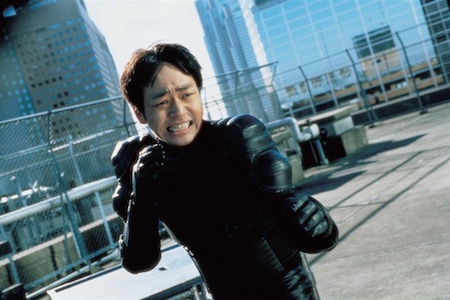Takashi Miike likes to throw around the word “love.” When promoting 13 Assassins, he said that “sword-fighting scenes are about love.” He’s called Ichi the Killer a film about love. While being beaten by his girlfriend, Kakihara, the sadomasochistic yakuza enforcer, tells her, “There’s no love in your punches.”
If Ichi the Killer is about love, it’s not the kind of love people write pop songs about. It’s not the kind people usually make movies about, either. The boss of the Anjo gang has disappeared, and Kakihara will stop at nothing to find out what has happened to him. Kakihara is not driven by duty or loyalty; rather, he needs the pain Boss Anjo inflicted on him. When he learns the boss has been killed by the mysterious Ichi, he begins hunting for Ichi as both Boss Anjo’s murderer and his possible successor.

Ichi the Killer is adapted from the manga original by Hideo Yamamoto, and the film hews closely to the comic. But Miike brings his own visual vocabulary to the film, especially when Kakihara is on the screen: he’s arrayed in dazzling colors against backdrops saturated with rich reds—a startling contrast to the workaday dullness of his fellow yakuza soldiers. The colors, coupled with the hilarious, shocking violence he commits, elicit Ohbayashi’s “Hausu” whenever Kakihara appears.
In this scene, Jiro has just torn a man’s arm off with his bare hands, just to see if it was possible. He’s still holding the arm when he turns to see Ichi in the doorway. Miike gives us an uncharacteristically long look at Jiro so we see the fear playing across his face.
In the next shot we see the usually dour Kakihara giddy with excitement about his impending encounter with Ichi.
“All this anticipation. It’s been years since I felt such a mix of anxiety and anticipation. The few times I’ve felt this, I was let down in the end. I really want to lose myself in desperation. What if Ichi also lets me down?” Miike is already preparing us for the ambivalent ending he has in store.
‘It’s been years since I felt such a mix of anxiety and anticipation,’ says Kakihara. ‘The few times I’ve felt this, I was let down in the end. I really want to lose myself in desperation. What if Ichi also lets me down?’ Miike is already preparing us for the ambivalent ending he has in store.
Saburo senses that his twin brother, Jiro, has died—presumably at the hands of Ichi. Kakihara and Saburo rush back to the yakuza den to find Jiro lifeless, his skull caved in. The camera pans and we see two corpses: Miyu Miyu, the prostitute horrifically tortured by Jiro and Saburo, then beaten to death by ostensible “good guy” and erstwhile policeman, Kaneko; and Long, tortured by Kakihara and finished off by Jiro.
“Damn,” says Saburo about his twin brother. “I was looking forward to killing Jiro myself one day.”
What happens next isn’t explicable in any normal sense: A drop of semen hits the ground. The dead twin’s arm shoots out and grabs his brother. Ichi cleaves Saburo’s head from his shoulders. Blood spurts, and more semen splatters against the wall. The fearless Kakihara runs away, trailed by Kaneko. Ichi appears in the doorway, tentative and frightened. “The same as ever,” he says, knowing full well that none of us can escape the violence.
Even if we abhor the violence we’ve witnessed in the film’s first two hours, Miike has made us accomplices to it: we need to see the confrontation between Kakihara and Ichi as much as they need each other. Kakihara needs the pain only Ichi can inflict, while Ichi needs Kakihara to stop him from killing.
Will Miike oblige his audience and his characters? Yes, and no. For Miike, like for Lynch, time, point of view, and even identity are malleable, and the viewer is ultimately left to make sense of the film’s conclusion.



